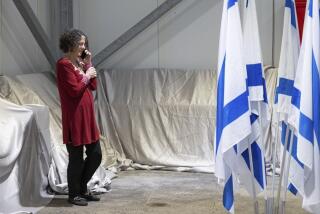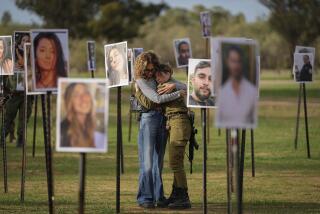Kuwaitis in Exile Fear for Those at Home
- Share via
The reports say that Kuwaitis who had endured torture are now being hunted down and killed. A prevailing rumor holds that Iraqis are under orders to round up 40,000 Kuwaiti citizens to be used as human shields. That is about one in 10 Kuwaitis left inside their homeland, and the belief is that many will die.
Yet, amid the horror, Kuwaitis in exile say that reports from the resistance inside their country characterize the mood of citizens as a mixture of dread and hope. The latest round of Iraqi atrocities--called “terrorism’s finest hour” by a U.S. Marine commander--is viewed by many Kuwaitis as the sad but expected prelude to freedom.
“We know their morale is high in Kuwait because they hope for liberation,” said Qusay Shatti, a volunteer at Citizens for a Free Kuwait, a group based in Washington. This is true, Shatti said, despite the belief that a ground war will produce “horrendous human casualties, and maybe a big amount of Kuwaiti civilians will be killed.”
“From the begining, they were cheering every bomb that was hitting from the allies. And I assume this feeling has prevailed along,” said Anwar Ali, a student at Claremont College. “Now, people are so worried and frightened that some of their families would be rounded up. But in terms of forces attacking Iraqis, they are cheering them on.”
After more than six months of brutal occupation, living conditions are horrendous inside Kuwait, said Adnan Saleh, an investment adviser in Los Angeles. With medical care almost nonexistent and food scarce, “They’ve just had it with the Iraqis,” he said.
These Kuwaitis living in the United States are among thousands in exile who rely on an irregular flow of information from the resistance inside their besieged nation. A five-page communique that arrived Friday offered some of the most horrific news since the earliest days after the Iraqi invasion Aug. 2.
Kuwaitis here called the report horrifying but not surprising, based on Iraqi President Saddam Hussein’s notorious human rights record and previous Iraqi atrocities during the occupation. Kuwaitis suggest that accounts that torture victims are being targeted for execution reflect an attempt by Hussein and Iraqi authorities to erase evidence of war crimes.
The reports are impossible to confirm. Iraqi authorities, while allowing some Western journalists inside Iraq under close government supervision, have not allowed media inside Kuwait during the occupation.
The resistance communique said that Kuwaiti men between the ages of 15 and 40 were being captured at checkpoints, while women, old men and citizens of other nationalities were allowed to pass through. Some people were being blindfolded and transported to Iraq, the communique said.
It cited “rumors” that Iraqis had orders to round up 40,000 Kuwaiti citizens.
“Nobody is now going out walking or by his car. But we are much worried of the next step which might be very soon, and that is that they might come to the houses and take the Kuwaiti citizens from their houses,” the communique said.
On another page, it stated: “Now we hear that they are taking innocent people from the streets of the city for any simple reason and take them to use them as human shield. This is normal daily routine.”
The resistance also portrayed Iraqi military authorities as “a group of criminals and thieves” who have ordered ransoms of cash for the release of some prisoners. Saleh, the Los Angeles investment counselor, said that a ransom of 10,000 Iraqi dinars is the equivalent to about five years pay for an Iraqi soldier.
Eyewitnesses reported seeing executions of victims in different parts of Kuwait city. “Many of the prisoners were savagely killed,” the report said. Victims had been decapitated, shot and mutilated, and evidence of tortures was apparent, according to the report.
The resistance report said that “local citizens have become experts with the Iraqi enemy mentality and behavior, and they consider the enemy unreliable and cannot be trusted.”
In addition to the report, Kuwaitis spread news by word of mouth. Ali, the student who is also a volunteer at the Kuwait-American Friendship Council based in Southern California, said he learned from relatives in London that a Kuwaiti woman who had transformed her home into a medical clinic had been executed.
An American woman who was evacuated from Kuwait with her two children six weeks after the Aug. 2 invasion, leaving her Kuwaiti husband behind, said she believed the horror stories to be accurate, based on her experience with the Iraqi occupation. “I wish it weren’t true, but I think it is,” said the woman who uses an alias to protect her husband’s identity.
Like many Kuwaitis here, Fahed Bouresli, a 25-year-old student at Chaffey College, said many weeks have passed since he received word of the fate of his relatives inside Kuwait. He described the latest reports as “scary” and the feelings of Kuwaitis as “confused.”
“It’s getting worse and worse inside Kuwait,” said Bouresli. “We had a feeling the Iraqis would do something like that.”
Bouresli expressed gratitude for the American public’s sympathy for the plight of Kuwaitis: “Now they . . . understand, thank God, that the Kuwaitis are being killed every day, and they need someone to come in and free them from the aggressors.”
More to Read
Sign up for Essential California
The most important California stories and recommendations in your inbox every morning.
You may occasionally receive promotional content from the Los Angeles Times.













